Test in production without watermarks.
Works wherever you need it to.
Get 30 days of fully functional product.
Have it up and running in minutes.
Full access to our support engineering team during your product trial
Security is crucial in today's software architecture, particularly when it comes to user permission and authentication. As a top framework for putting OpenID Connect and OAuth 2.0 into practice, IdentityServer4 offers a reliable option for centralized authorization and authentication in dispersed networks. When developers pair IronPDF, a potent C# library for PDF generation, with secure identity management, they can easily combine the two to create PDF documents that meet a variety of application requirements.
IdentityServer4 provides a modular, standards-based solution that makes identity management installation easier. With its help, developers may create a centralized identity provider that handles user authentication, access, token validation and issuance, and permission validation for a variety of services and apps. IdentityServer4 enables developers to create safe and intuitive authentication experiences by supporting many authentication methods, such as username/password, social logins, and multi-factor authentication.
This tutorial will cover the C# integration of IdentityServer4 with IronPDF, showing how to use IdentityServer4 to create secure processes for authorization and authentication and how to use the user identities that are created to customize IronPDF's PDF document creation. We'll go over how to improve the security and functionality of your C# apps, from configuring IdentityServer4 as a centralized identity and authentication provider to integrating IronPDF for dynamic PDF production.
A well-liked open-source framework called IdentityServer4 is used in .NET and C# applications to perform identity management, authorization, and authentication. It is a flexible solution for securing web applications, APIs, and microservices because it is made to comply with contemporary security protocols like OpenID Connect and OAuth 2.0.
IdentityServer4 functions essentially as a centralized authentication server, handling user identification and permission management core identity, valid access token issuance, and credential validation. It gives programmers the ability to integrate federated authentication and single sign-on (SSO) into several applications and services, resulting in a safe and smooth end-user experience.
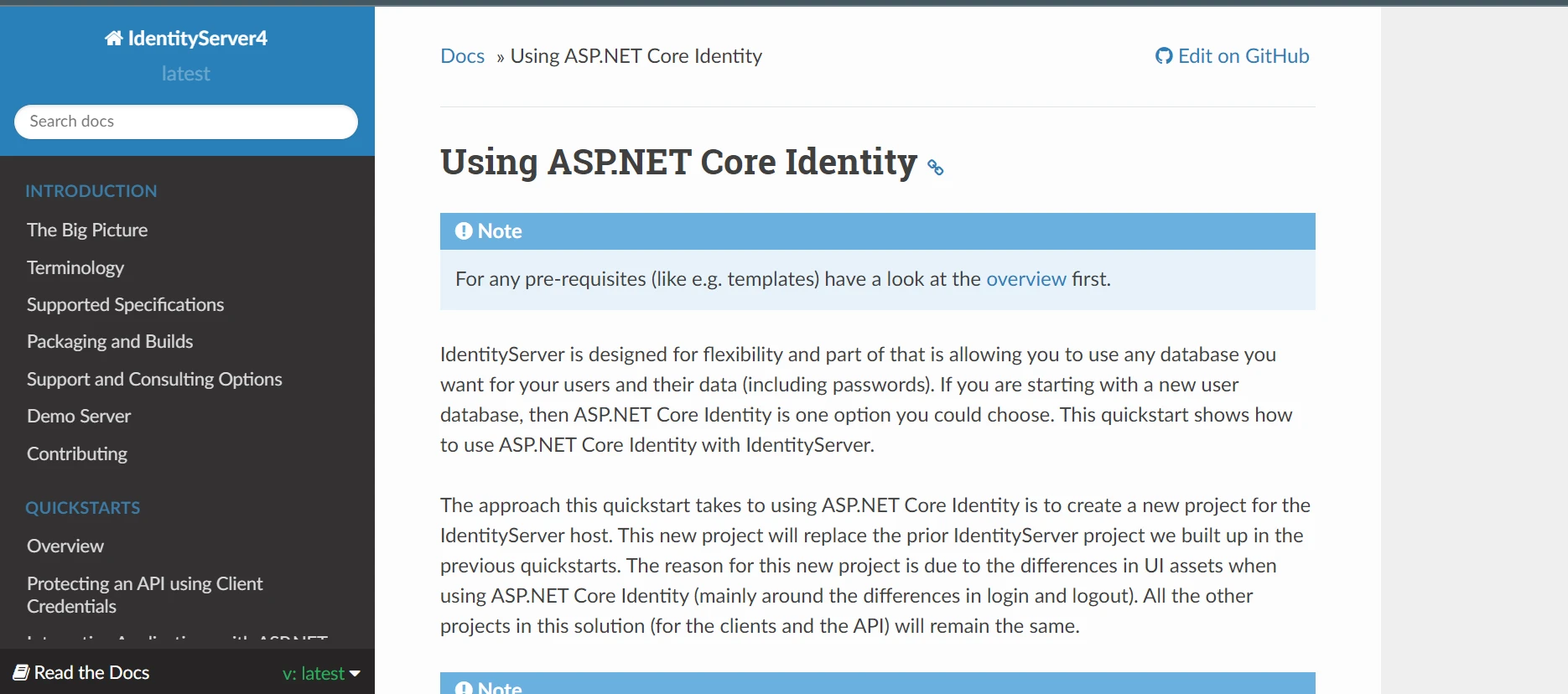
Without having to re-enter their credentials, users can access different applications or services with only one authentication.
In order to provide compatibility with and support a broad range of client applications and platforms, IdentityServer4 offers industry-standard protocols for secure authentication and authorization.
Developers can customize the security settings to match certain application requirements since they have fine-grained control over how authentication and permission policies are configured.
Authentication for ASP.NET Core web apps and APIs is simple to implement thanks to IdentityServer4's smooth integration with the framework.
Because of the framework's great degree of extensibility and customization, developers can add new user stores, identity providers, test users, and authentication workflows as needed.
IdentityServer4 gives developers the flexibility to select the authentication mechanism configuration that best fits their web application's requirements. These mechanisms include username/password, social logins (like Google, Facebook, etc.), and external identity providers (like Active Directory, Azure AD, etc.).
In order to guarantee that only authorized users can access particular resources or carry out particular actions within the application, developers can build fine-grained authorization policies based on user roles, claims, or other criteria.
Access tokens, token refresh tokens, and identity tokens are all managed by IdentityServer4, which offers a safe method of user authentication and permission to access resources that are protected by the identity server.
In order to set up IdentityServer4 in a C# project in Visual Studio, you must do the following steps:
After starting the Visual Studio application, you can either select the "Create a new project" option or you can choose File menu > Add > "New project". Next, pick "Asp.NET core Web App (Model-View-Controller)" after choosing "new project". We'll use this application to make PDF documents in this tutorial.
New project option. Then select ASP.NET Core Web App" />
Select the file path and enter the project name in the corresponding text box. Next, pick the necessary Dot .NET Framework by clicking the Create button, as seen in the screenshot below.
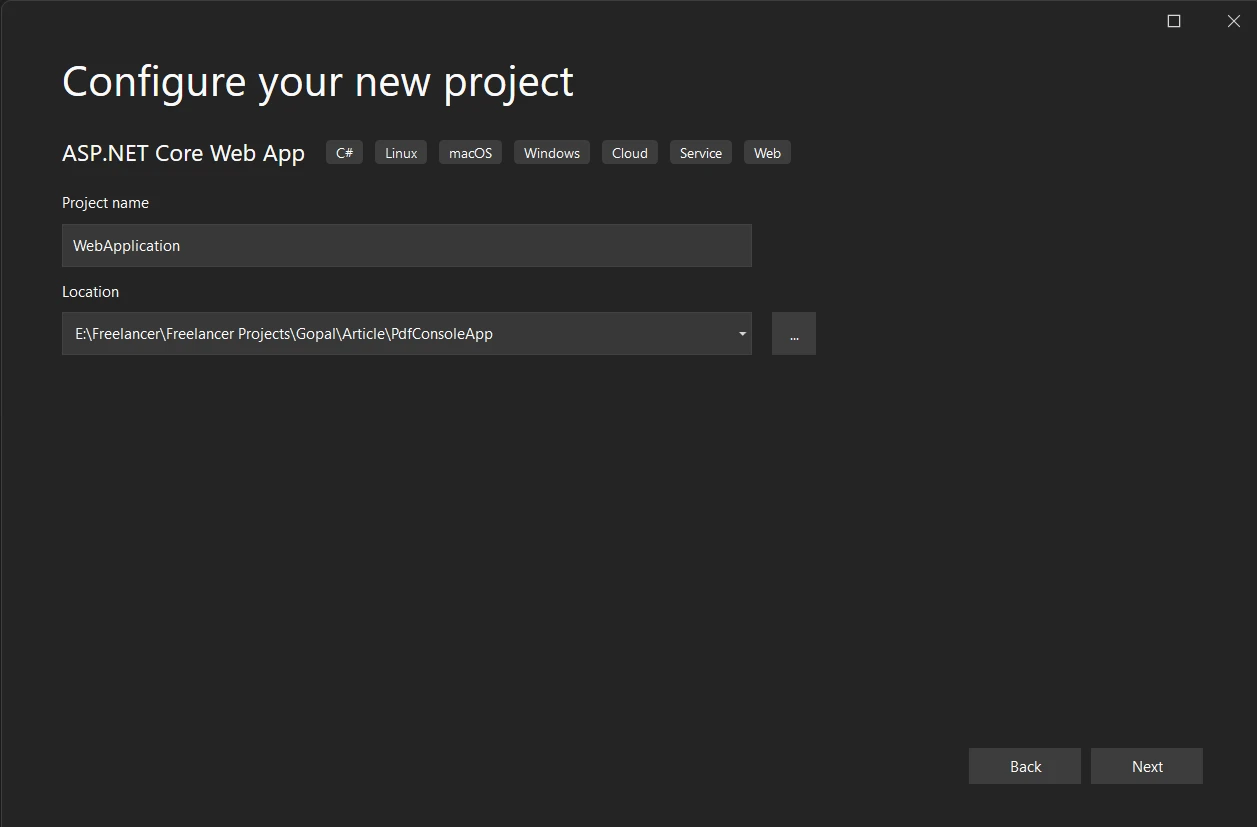
Next, decide which framework is needed and press the Create button.
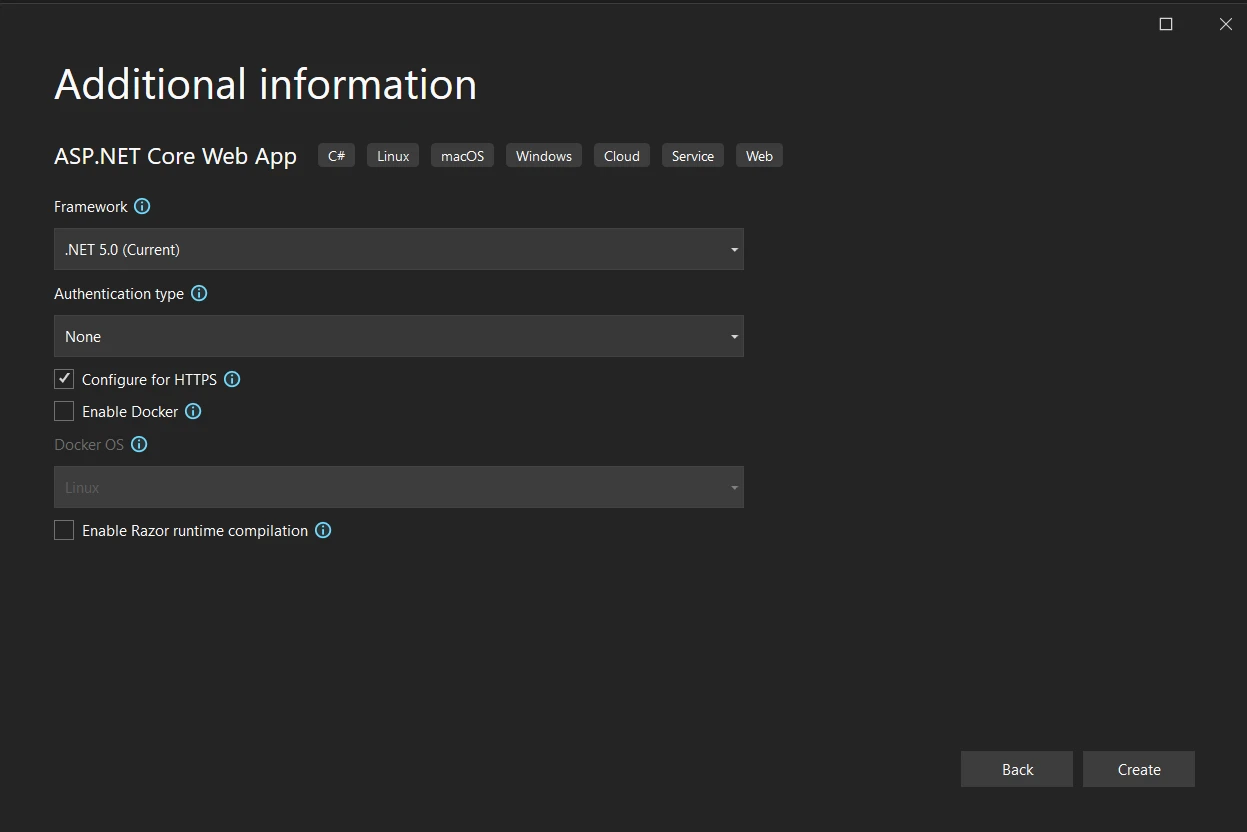
The structure for the chosen application will now be generated by the Visual Studio project. We're using ASP.NET MVC in this example. In order to write the code, we may either create a new controller or utilize the one that already exists, which allows you to enter the code and build/run the program.

To test the code, we can then add the library.
Using the .NET CLI or NuGet Package Manager in Visual Studio, add the IdentityServer4 package to your project. Using the Package Manager Console or a terminal, type the following command to install the latest version of the package:
Install-Package IdentityServer4Install-Package IdentityServer4IRON VB CONVERTER ERROR developers@ironsoftware.comIn your ASP.NET Core application, configure IdentityServer4 by adding the required authentication middleware and services to the Startup.cs file. An introductory code example of configuring IdentityServer4 is provided here:
using Microsoft.AspNetCore.Builder;
using Microsoft.AspNetCore.Hosting;
using Microsoft.Extensions.DependencyInjection;
using Microsoft.Extensions.Hosting;
public class Startup
{
public void ConfigureServices(IServiceCollection services)
{
services.AddIdentityServer()
.AddInMemoryClients(Config.Clients)
.AddInMemoryIdentityResources(Config.IdentityResources)
.AddInMemoryApiScopes(Config.ApiScopes)
.AddInMemoryApiResources(Config.ApiResources)
.AddTestUsers(Config.Users);
}
public void Configure(IApplicationBuilder app, IWebHostEnvironment env)
{
if (env.IsDevelopment())
{
app.UseDeveloperExceptionPage();
}
app.UseIdentityServer();
}
}using Microsoft.AspNetCore.Builder;
using Microsoft.AspNetCore.Hosting;
using Microsoft.Extensions.DependencyInjection;
using Microsoft.Extensions.Hosting;
public class Startup
{
public void ConfigureServices(IServiceCollection services)
{
services.AddIdentityServer()
.AddInMemoryClients(Config.Clients)
.AddInMemoryIdentityResources(Config.IdentityResources)
.AddInMemoryApiScopes(Config.ApiScopes)
.AddInMemoryApiResources(Config.ApiResources)
.AddTestUsers(Config.Users);
}
public void Configure(IApplicationBuilder app, IWebHostEnvironment env)
{
if (env.IsDevelopment())
{
app.UseDeveloperExceptionPage();
}
app.UseIdentityServer();
}
}IRON VB CONVERTER ERROR developers@ironsoftware.comConfiguring clients, identity resources (scopes), configuration, database, and API resources is necessary for IdentityServer4. These configurations can be defined in a different class, like Config.cs:
public class Config
{
public static IEnumerable<Client> Clients { get; set; }
public static IEnumerable<IdentityResource> IdentityResources { get; set; }
public static IEnumerable<ApiScope> ApiScopes { get; set; }
public static IEnumerable<ApiResource> ApiResources { get; set; }
public static List<TestUser> Users { get; set; }
}public class Config
{
public static IEnumerable<Client> Clients { get; set; }
public static IEnumerable<IdentityResource> IdentityResources { get; set; }
public static IEnumerable<ApiScope> ApiScopes { get; set; }
public static IEnumerable<ApiResource> ApiResources { get; set; }
public static List<TestUser> Users { get; set; }
}IRON VB CONVERTER ERROR developers@ironsoftware.comBy following these instructions, you can enable secure authentication and authorization in your ASP.NET Core apps by creating and configuring IdentityServer4 in a C# project.
These instructions will walk you through configuring IdentityServer4 for safe authentication and authorization code and using IronPDF to create PDF documents in a C# project. You will learn how to create a project based on a basic setup by following this instruction.
For use in .NET applications, IronPDF is a feature-rich library for interacting with PDF documents. With its extensive feature set, users can create PDFs from scratch or from HTML content, as well as add, remove, or rearrange sections of already-existing PDF documents. IronPDF gives developers a robust API for producing, modifying, and converting PDF files, which simplifies working with PDFs in .NET applications.
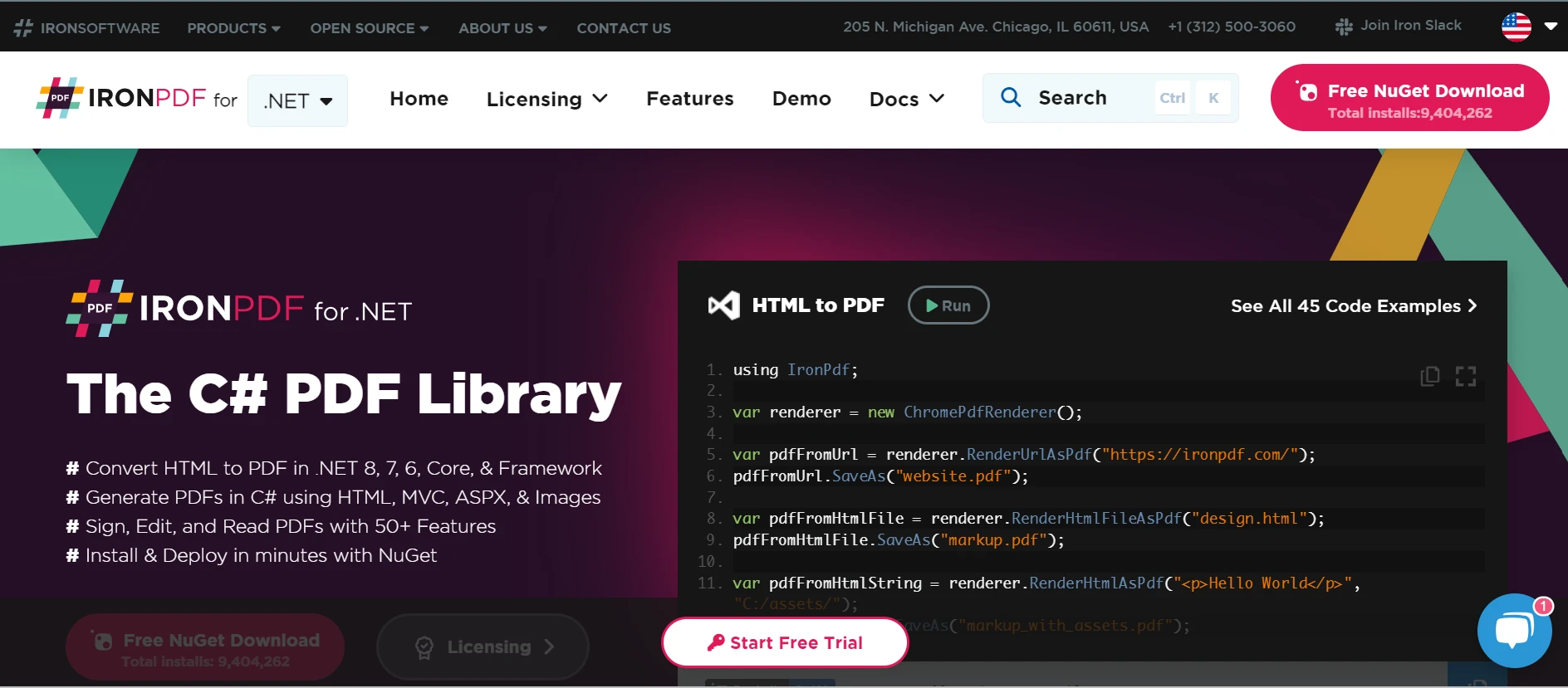
With IronPDF, you may produce PDF documents that are of excellent quality by using HTML content, including JavaScript and CSS. This functionality comes in handy when creating PDFs from websites or dynamic information.
IronPDF allows you to alter PDF documents that already exist. One can combine many PDFs into one document, extract the pages from a PDF, and add text, photos, watermarks, or comments.
With IronPDF's API, you may programmatically add text, photos, shapes, and other objects to newly created PDF documents. This makes it possible to generate PDF invoices, reports, and other document-based outputs dynamically.
You can manage access and safeguard critical data by encrypting PDF documents using IronPDF and adding password security.
With IronPDF, users may work with PDF documents by creating, filling out, and submitting PDF forms, as well as entering data into form fields.
IronPDF is a tool that helps with text data manipulation, analysis, and search by extracting text information from PDF documents.
IronPDF is useful in situations where photos are required instead of PDFs because it can convert PDF documents to common picture formats including PNG, JPEG, and BMP.
Use the .NET CLI or NuGet Package Manager to add the latest version of IronPDF to your project now.
dotnet add package IronPdfdotnet add package IronPdf'INSTANT VB TODO TASK: The following line uses invalid syntax:
'dotnet add package IronPdfSet up the required services and middleware for IdentityServer4 in your Startup.cs file. similar to the code seen above. Then create a new MVC Controller named PdfController.cs to handle PDF generation using IronPDF.
using Microsoft.AspNetCore.Authorization;
using Microsoft.AspNetCore.Mvc;
using IronPdf;
using System.Threading.Tasks;
[Authorize]
public class PdfController : Controller
{
public async Task<IActionResult> GeneratePdf()
{
// Create IronPDF Renderer
var Renderer = new IronPdf.ChromePdfRenderer();
// HTML content to be converted to PDF
string htmlContent = "<h1>Hello, IronPDF!</h1><p>This is a generated PDF document.</p>";
// Convert HTML to PDF asynchronously
var pdfDocument = await Task.Run(() => Renderer.RenderHtmlAsPdf(htmlContent));
// Return the PDF as a file
return File(pdfDocument.BinaryData, "application/pdf", "example.pdf");
}
}using Microsoft.AspNetCore.Authorization;
using Microsoft.AspNetCore.Mvc;
using IronPdf;
using System.Threading.Tasks;
[Authorize]
public class PdfController : Controller
{
public async Task<IActionResult> GeneratePdf()
{
// Create IronPDF Renderer
var Renderer = new IronPdf.ChromePdfRenderer();
// HTML content to be converted to PDF
string htmlContent = "<h1>Hello, IronPDF!</h1><p>This is a generated PDF document.</p>";
// Convert HTML to PDF asynchronously
var pdfDocument = await Task.Run(() => Renderer.RenderHtmlAsPdf(htmlContent));
// Return the PDF as a file
return File(pdfDocument.BinaryData, "application/pdf", "example.pdf");
}
}IRON VB CONVERTER ERROR developers@ironsoftware.comUsing IdentityServer4 to set up secure user authentication and authorization, followed by IronPDF to create PDF documents that are only accessible by authenticated users, is the process of integrating IronPDF with IdentityServer4 in a C# application. The code example provided has IdentityServer4 configured in the Startup.cs file to handle user identity management through in-memory configurations and handle client credentials.
Only authorized users can access the operations of the PdfController since it is protected with the [Authorize] attribute. This controller uses an asynchronous method to render HTML information into PDF format using the IronPDF library. The steps in the PDF generating process are building a ChromePdfRenderer renderer; transforming HTML text into a PDF document; and sending the PDF back as a file response.
To combine strong security with dynamic document generation capabilities, the integration embeds the PDF generation logic inside a secured endpoint, guaranteeing that only users who have been verified by IdentityServer4 can initiate the PDF creation. This method works especially well in applications that need to handle documents securely, including creating invoices, reports, or customized content based on user-specific information, all while enforcing stringent access control via IdentityServer4.
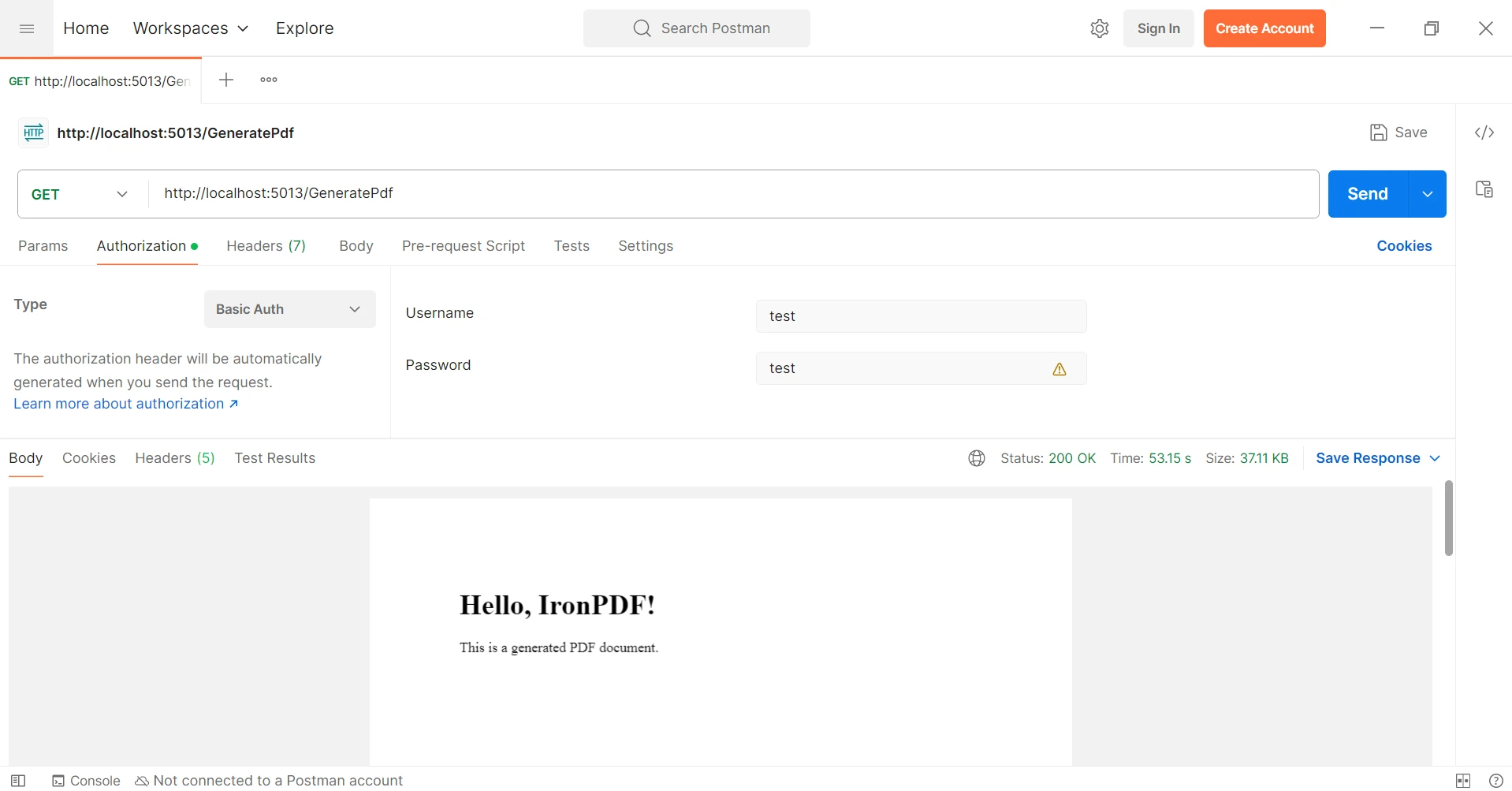
To sum up, the integration of IdentityServer4 with IronPDF in a C# project successfully blends strong security with the ability to create dynamic PDFs. By offering a single and standardized method of managing user identities and access control across several applications and services, IdentityServer4 guarantees secure user authentication and authorization. Through the usage of IronPDF, developers may produce PDF documents of superior quality that are only accessible by authorized users, all based on verified user data.
This integration improves application security and functionality, which makes it perfect for scenarios like creating invoices, reports, and personalized content that call for safe document processing. All things considered, the combination of IdentityServer4 and IronPDF provides a strong option for creating safe, effective, and user-focused apps within the .NET framework.
When IronPDF and Iron Software technologies are integrated into your enterprise applications development stack, IronPDF can provide feature-rich developer documentation and premium software solutions for customers and end users. This solid basis will also make projects, backend systems, and process enhancement easier.
IronPDF Suite, a combination of 9 different .NET API products, is available for a competitive licensing price!
These technologies are excellent choices for modern software development projects because of their extensive documentation, active online developer community, and regular upgrades.